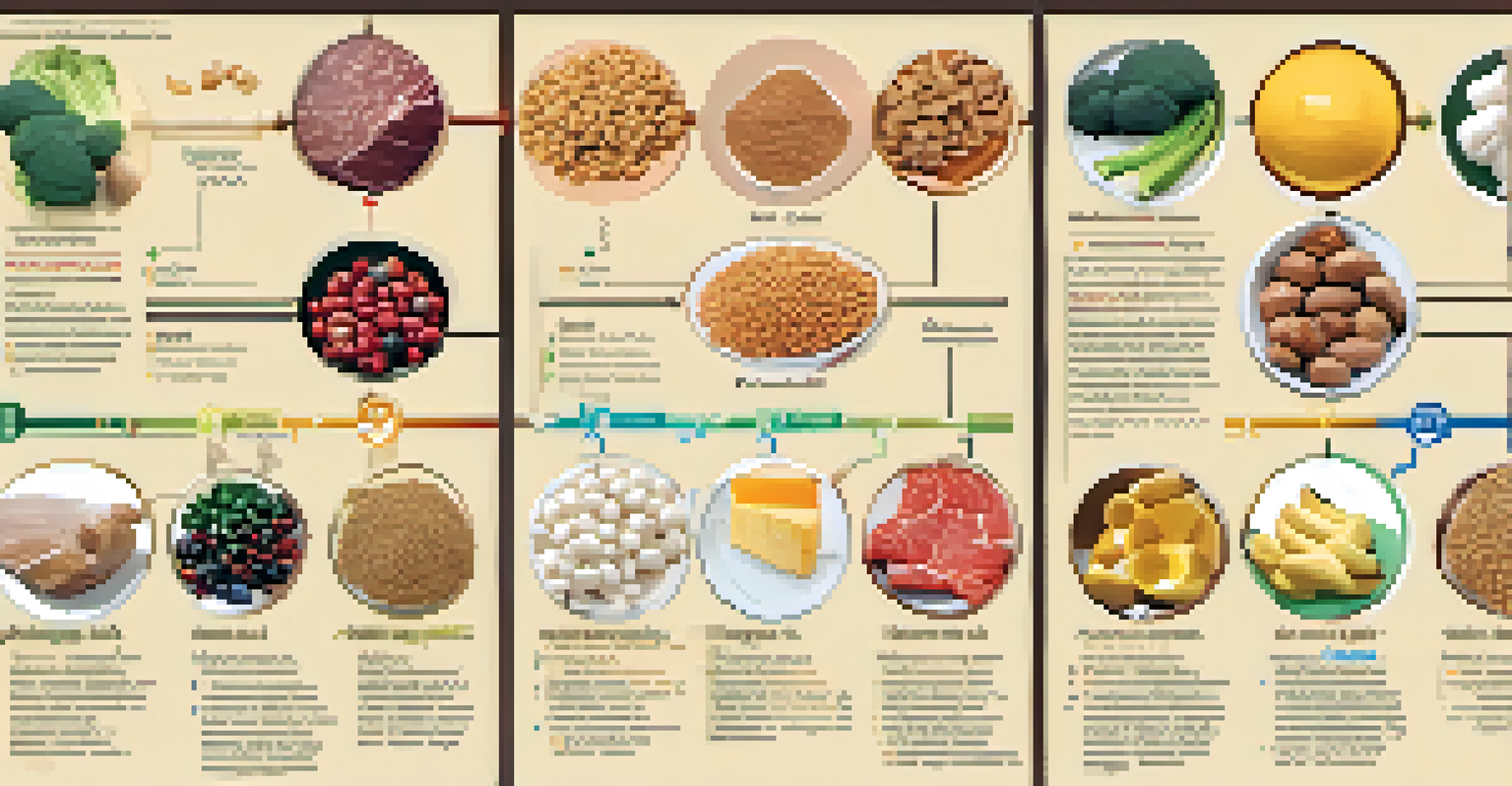Nutrition Basics for New Powerlifters: What to Eat

Understanding the Role of Nutrition in Powerlifting
Nutrition plays a pivotal role in powerlifting, acting as the fuel for your workouts and recovery. Just like a car needs fuel to run efficiently, your body requires the right nutrients to perform at its best. This means paying attention to what you eat, as it can directly influence your strength gains and overall performance.
You are what you eat, so don't be fast, cheap, easy, or fake.
For new powerlifters, it’s crucial to understand that the right balance of macronutrients—proteins, carbohydrates, and fats—will help you achieve your goals. Each of these macronutrients serves a unique purpose; for instance, protein is essential for muscle repair, while carbohydrates provide the necessary energy for intense lifting sessions.
By prioritizing nutrition, you not only enhance your lifting capacity but also promote better recovery. This allows you to train harder and more consistently, setting a solid foundation for your powerlifting journey.
Key Macronutrients: Proteins, Carbs, and Fats
As a powerlifter, focusing on the three main macronutrients—proteins, carbohydrates, and fats—is vital. Proteins are the building blocks of muscle and should be a staple in your diet. Aim for high-quality sources like lean meats, eggs, dairy, and plant-based options like legumes and tofu to meet your protein needs.

Carbohydrates, often misunderstood, are not the enemy! They are your primary source of energy, especially during high-intensity workouts. Prioritize complex carbs such as whole grains, fruits, and vegetables, which will provide sustained energy and help fuel your lifts.
Nutrition Fuels Powerlifting Success
The right balance of macronutrients is essential for enhancing strength gains and recovery in powerlifting.
Don’t forget about fats, which are essential for hormone production and overall health. Incorporating healthy fats from sources like nuts, seeds, avocados, and olive oil will not only support your energy levels but also keep you feeling satisfied throughout the day.
Determining Your Caloric Needs
Calculating your caloric needs is a fundamental step for any new powerlifter. The amount of calories you require depends on several factors, including your age, weight, height, and activity level. A simple way to estimate your needs is to use the Total Daily Energy Expenditure (TDEE) formula, which helps you understand how many calories you burn daily.
Nutrition is not just about eating; it's about learning to live.
Once you determine your TDEE, you can adjust your caloric intake based on your goals. If you’re looking to gain strength and muscle mass, aim for a caloric surplus; conversely, if you need to shed some weight, a caloric deficit is necessary. Remember, it's about finding the right balance that works for you.
Monitoring your progress and adjusting your food intake as needed will help you stay on track. Don’t hesitate to consult with a nutritionist or dietitian who specializes in sports nutrition for personalized advice tailored to your specific goals.
Meal Timing: When to Eat for Optimal Performance
Meal timing can significantly impact your performance in the gym. Consuming the right foods at strategic times can help you maximize your energy during workouts and aid in recovery afterward. A good rule of thumb is to eat a balanced meal containing carbs and protein about 2-3 hours before training.
Post-workout nutrition is equally important. After lifting, your muscles are primed to absorb nutrients, making it an ideal time for a protein-rich meal or snack. Aim to consume a mix of carbohydrates and protein within 30-60 minutes of finishing your workout to replenish glycogen stores and support muscle recovery.
Caloric Needs Drive Performance
Understanding and adjusting your caloric intake based on activity level and goals is crucial for optimal performance.
Lastly, listen to your body and adjust your meal timing based on how you feel. Everyone is different, and what works for one person may not work for another, so find a routine that keeps you energized and ready to lift.
Hydration: The Unsung Hero of Nutrition
While we often focus on what we eat, hydration is just as crucial for powerlifters. Water plays a vital role in maintaining bodily functions and ensuring optimal performance. Dehydration can lead to fatigue, decreased strength, and impaired recovery, so it’s essential to stay hydrated throughout the day.
A good rule of thumb is to drink at least half your body weight in ounces of water daily, adjusting based on your activity level and climate. Consider adding electrolytes into your routine, especially during intense training sessions, to help maintain your body’s balance.
Keep a water bottle handy during workouts and sip regularly. You'll be surprised at how much better you feel and perform when you're adequately hydrated!
Supplements: Do You Really Need Them?
When it comes to supplements, new powerlifters often wonder if they are necessary. While a well-balanced diet should provide most of the nutrients you need, certain supplements can help fill in the gaps. For instance, protein powders can be a convenient way to increase your protein intake, especially post-workout.
Creatine is another popular supplement among powerlifters, known for enhancing strength and muscle mass. If you choose to explore supplements, it's important to do your research and consult with a healthcare professional to ensure their safety and effectiveness.
Hydration Supports Lifting Efficiency
Staying properly hydrated is vital for maintaining energy levels and ensuring effective recovery during powerlifting training.
Remember, supplements are just that—supplements. They should complement a solid nutrition plan, not replace whole foods. Focus on building a strong dietary foundation first.
Listening to Your Body: Adjusting Your Diet
Every powerlifter is different, and what works for one may not work for another. It’s essential to listen to your body and pay attention to how different foods and eating patterns affect your performance and recovery. Keeping a food diary can help you track what you eat and how you feel, making it easier to identify any patterns.
If you notice you’re feeling sluggish or not recovering well, it might be time to reassess your nutrition. Perhaps you need to increase your protein intake or adjust your carb consumption around workouts. Being flexible and open to change is key to finding the right nutrition plan for you.

Don’t be afraid to experiment and make adjustments as needed. Over time, you’ll discover what fuels your body best, helping you achieve your powerlifting goals.